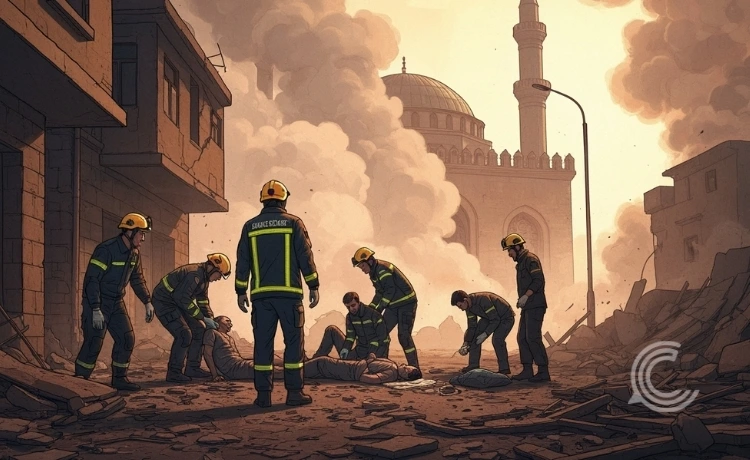Why Indonesia’s Mosques and Factories Are Exploding: Safety Crisis

Key Highlights–
- A mosque blast in Jakarta injured 54 people, weeks after industrial explosions rocked West Java and Batam.
- Analysts say these seemingly unrelated events reveal a single national failure, weak enforcement, and governance.
- As Indonesia heads toward its next election, the “zero-attack” agenda and safety promises face their toughest test yet.
On Friday, a blast tore through a mosque inside a school complex in Kelapa Gading, North Jakarta, injuring 54 worshippers and sending dozens to hospitals with burn wounds, according to Jakarta Police Chief Asep Edi Suheri.
The explosion followed a series of recent industrial accidents, including a nickel-smelter fire in Morowali last December and an ammunition depot blast in Garut, both of which left trails of death and destruction.
The Pattern of Neglect Behind Indonesia’s Recent Blasts
In a span of just months, Indonesia has been rocked by explosions that could not appear more different, one at a mosque during Friday prayers in Jakarta, and another at a shipyard in Batam that killed several workers. Yet both stem from the same invisible fault line running through Southeast Asia’s largest economy: a nationwide safety and enforcement breakdown.
Indonesia’s latest tragedies have sparked a critical question: How can both religious sanctuaries and factories, which are spaces of faith and labor, become equally unsafe?
A Timeline of Repeated Tragedies
The mosque explosion is only the latest in a disturbing string of deadly accidents:
- December 2023: A nickel-smelter furnace explosion in Morowali kills dozens, exposing lapses in industrial safety.
- March 2024: Fire at an ammunition depot in Garut, West Java, kills 13 people and damages nearby homes.
- October 2025: A tanker fire at a Batam shipyard kills at least ten, with reports of inadequate fire systems.
- November 2025: The mosque explosion in Jakarta injures over 50 worshippers during prayers.
These incidents share a common thread, systemic regulatory decay, where safety rules exist on paper but collapse in execution. Experts say these points point to a deeper national issue of uneven governance across Indonesia’s sprawling 17,000 islands.
Faith, Fear, and the Politics of Safety
The mosque explosion, coming months after regional elections and amid the government’s “Zero Attack” agenda, has put the administration on the defensive.
The Indonesian National Police (Polri) had pledged to eliminate all forms of violent extremism and public safety lapses ahead of the 2024 regional elections, which were held on November 27, 2024, across more than 500 districts.
Now, that commitment faces a credibility crisis.
The Myth of “Zero Attacks” Meets Reality
On June 27, 2024, BNPT chief Mohammed Rycko Amelza Dahniel declared in parliament that “throughout 2023 until now, June 2024, there has not been a single terrorist attack in Indonesia, zero terrorist attacks,” as reported by Antara News. Later, on December 9, 2024, Coordinating Minister for Political and Security Affairs Budi Gunawan reiterated the same achievement on the Polri website, calling it “a great success” and a sign of Indonesia’s security resilience.
But the latest explosion, even if not terror-linked, exposes how fragile that sense of safety really is. It has reignited a conversation about what “security” truly means in Indonesia: is the absence of terrorism enough if citizens remain unsafe from preventable accidents, corruption, and institutional neglect?
A Nation at a Crossroads
Analysts warn that as Indonesia heads toward national elections, even non-terror explosions could undermine confidence in President Prabowo Subianto’s vision of stability and growth.
Furthermore, Indonesia’s rapid rise as a global manufacturing and critical minerals hub, especially after signing new rare-earth deals and courting investors amid China’s supply chain dominance, highlights both immense opportunity and mounting risk. Experts say that without stronger governance and enforcement, these economic gains could prove fragile.
Each blast now mirrors a deeper imbalance: a nation chasing industrial glory while safety oversight lags. Until Indonesia enforces accountability with the same urgency it pursues investment, its growth story will remain vulnerable.



